International Business Report: WTO Effectiveness and Policies
VerifiedAdded on 2022/12/23
|13
|3714
|39
Report
AI Summary
This report provides an in-depth analysis of international business, focusing on the role and impact of the World Trade Organization (WTO). It begins with an executive summary and introduction, followed by a literature review that explores the motivations behind the WTO's formation, its key functions, and the challenges it faces in promoting international trade. The report examines the WTO's suitability and assesses its effectiveness by providing examples of how specific companies are affected by its policies. It highlights the organization's role in facilitating global trade, establishing regulations, and resolving trade-related conflicts. The report also discusses the challenges, such as dependence on developed countries and the impact of trade negotiations on developing nations. The analysis section evaluates international business practices, emphasizing how they are shaped by economic theories and functions, and examines the patterns of international trade and investment. The report concludes with recommendations and a summary of the key findings, underscoring the WTO's significance in shaping the global economy and its impact on various businesses.
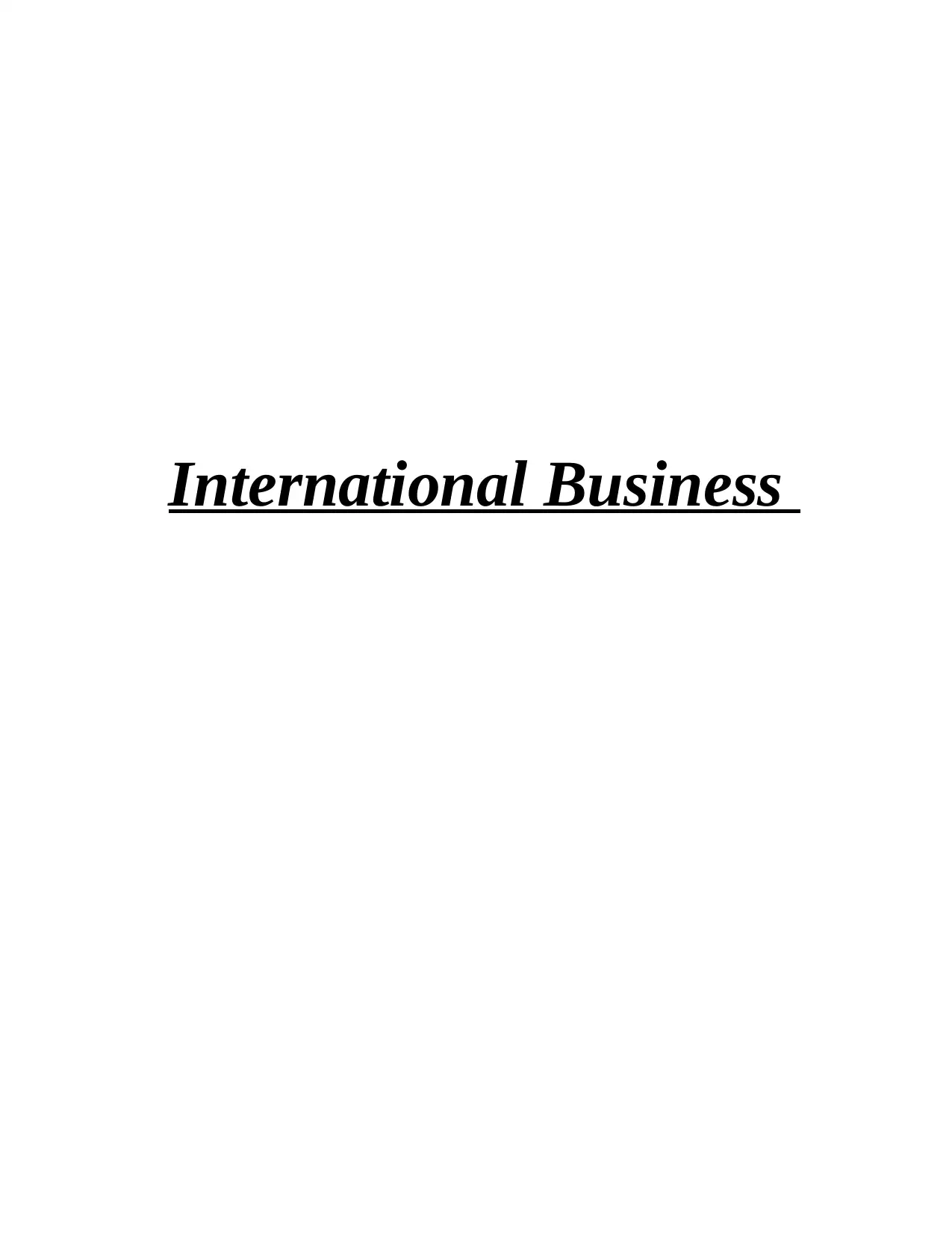
International Business
Paraphrase This Document
Need a fresh take? Get an instant paraphrase of this document with our AI Paraphraser
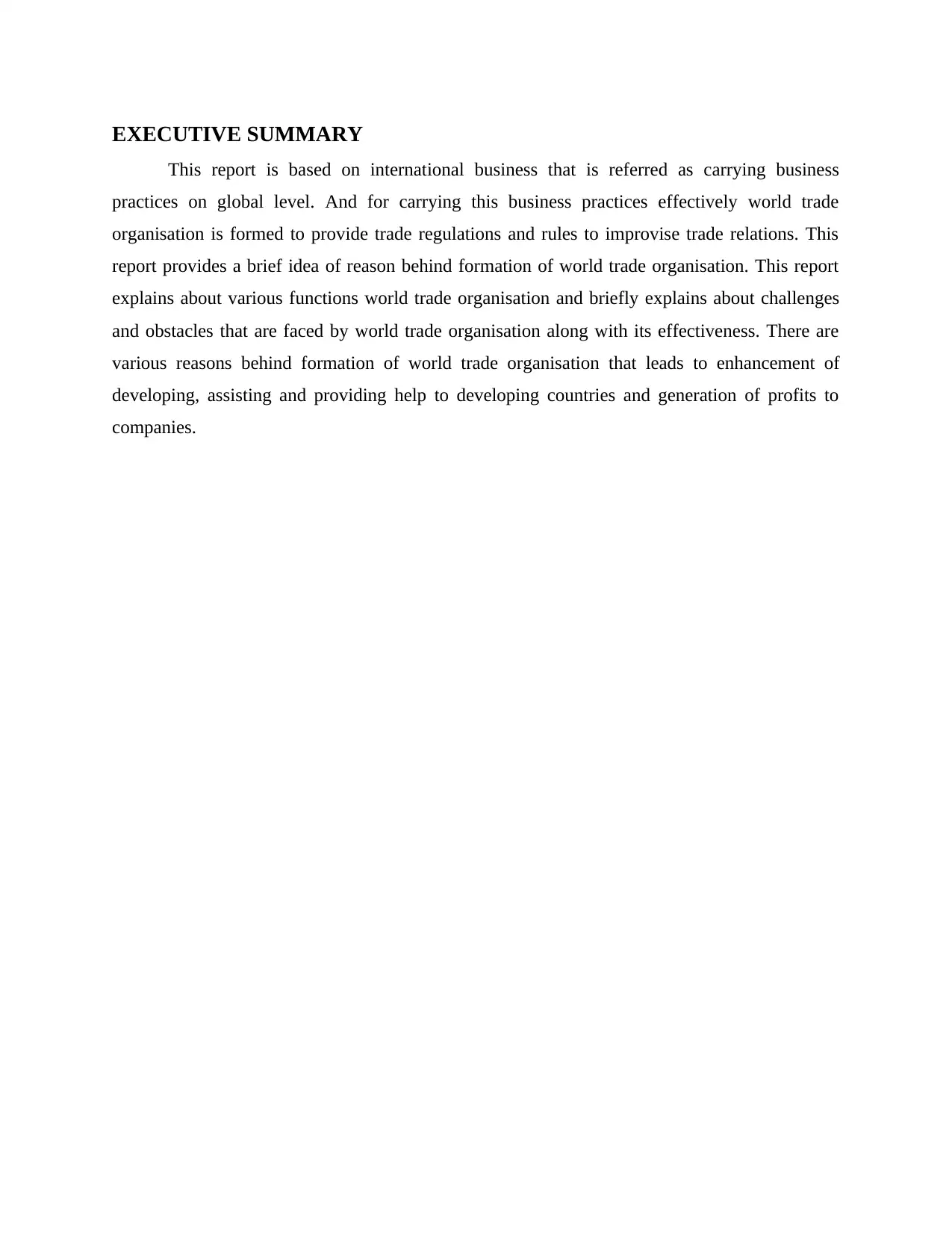
EXECUTIVE SUMMARY
This report is based on international business that is referred as carrying business
practices on global level. And for carrying this business practices effectively world trade
organisation is formed to provide trade regulations and rules to improvise trade relations. This
report provides a brief idea of reason behind formation of world trade organisation. This report
explains about various functions world trade organisation and briefly explains about challenges
and obstacles that are faced by world trade organisation along with its effectiveness. There are
various reasons behind formation of world trade organisation that leads to enhancement of
developing, assisting and providing help to developing countries and generation of profits to
companies.
This report is based on international business that is referred as carrying business
practices on global level. And for carrying this business practices effectively world trade
organisation is formed to provide trade regulations and rules to improvise trade relations. This
report provides a brief idea of reason behind formation of world trade organisation. This report
explains about various functions world trade organisation and briefly explains about challenges
and obstacles that are faced by world trade organisation along with its effectiveness. There are
various reasons behind formation of world trade organisation that leads to enhancement of
developing, assisting and providing help to developing countries and generation of profits to
companies.
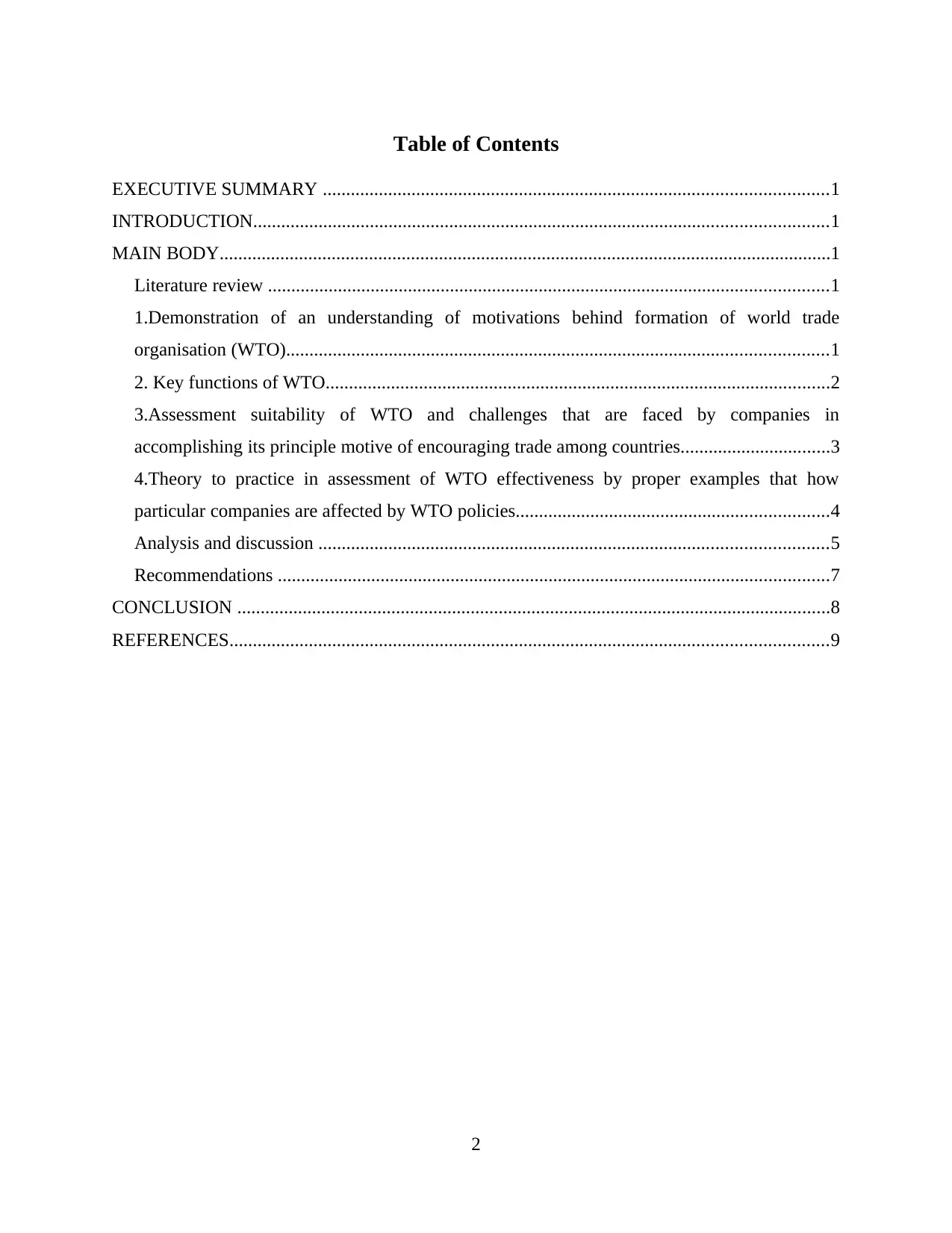
Table of Contents
EXECUTIVE SUMMARY ............................................................................................................1
INTRODUCTION...........................................................................................................................1
MAIN BODY...................................................................................................................................1
Literature review ........................................................................................................................1
1.Demonstration of an understanding of motivations behind formation of world trade
organisation (WTO)....................................................................................................................1
2. Key functions of WTO............................................................................................................2
3.Assessment suitability of WTO and challenges that are faced by companies in
accomplishing its principle motive of encouraging trade among countries................................3
4.Theory to practice in assessment of WTO effectiveness by proper examples that how
particular companies are affected by WTO policies...................................................................4
Analysis and discussion .............................................................................................................5
Recommendations ......................................................................................................................7
CONCLUSION ...............................................................................................................................8
REFERENCES................................................................................................................................9
2
EXECUTIVE SUMMARY ............................................................................................................1
INTRODUCTION...........................................................................................................................1
MAIN BODY...................................................................................................................................1
Literature review ........................................................................................................................1
1.Demonstration of an understanding of motivations behind formation of world trade
organisation (WTO)....................................................................................................................1
2. Key functions of WTO............................................................................................................2
3.Assessment suitability of WTO and challenges that are faced by companies in
accomplishing its principle motive of encouraging trade among countries................................3
4.Theory to practice in assessment of WTO effectiveness by proper examples that how
particular companies are affected by WTO policies...................................................................4
Analysis and discussion .............................................................................................................5
Recommendations ......................................................................................................................7
CONCLUSION ...............................................................................................................................8
REFERENCES................................................................................................................................9
2
⊘ This is a preview!⊘
Do you want full access?
Subscribe today to unlock all pages.

Trusted by 1+ million students worldwide
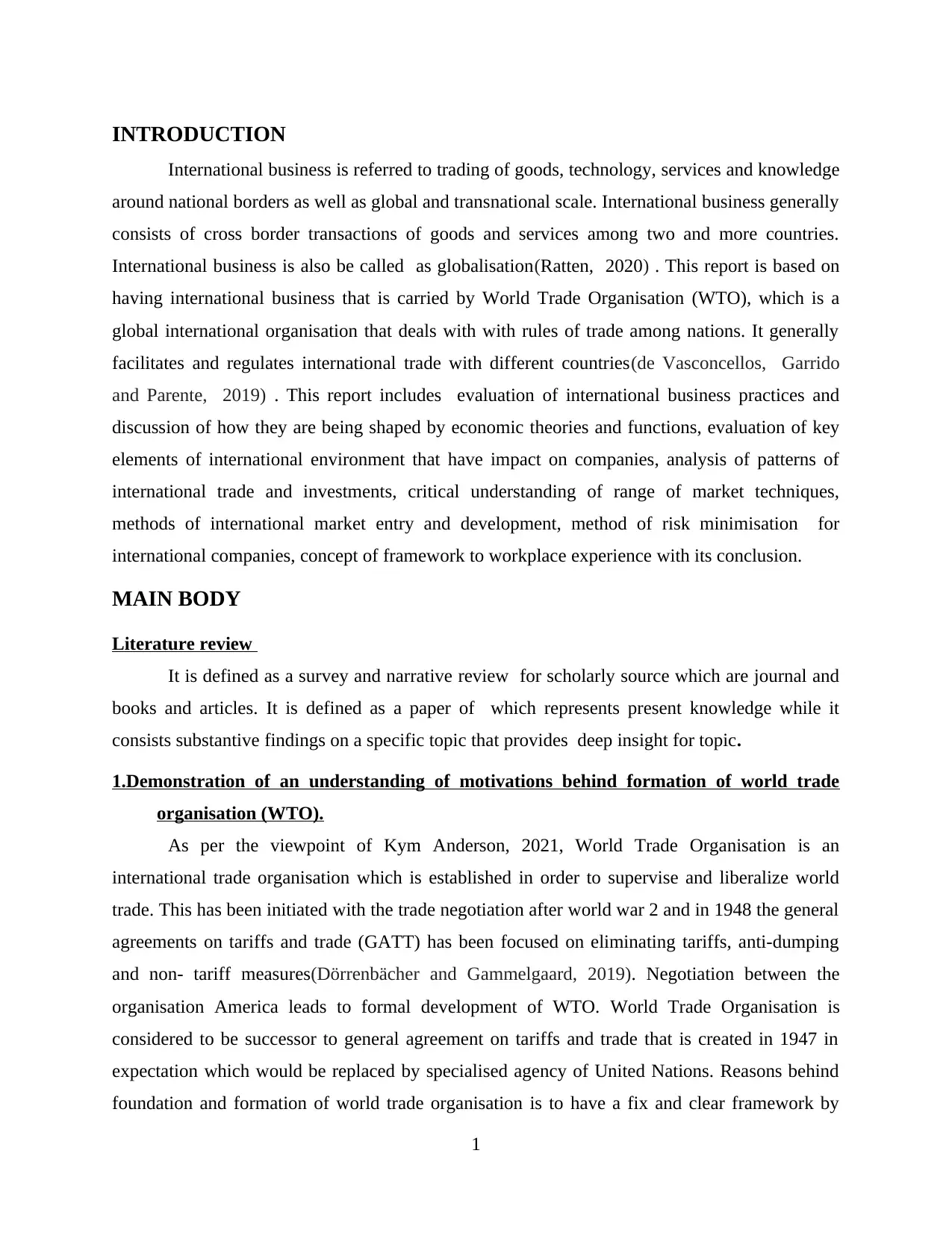
INTRODUCTION
International business is referred to trading of goods, technology, services and knowledge
around national borders as well as global and transnational scale. International business generally
consists of cross border transactions of goods and services among two and more countries.
International business is also be called as globalisation(Ratten, 2020) . This report is based on
having international business that is carried by World Trade Organisation (WTO), which is a
global international organisation that deals with with rules of trade among nations. It generally
facilitates and regulates international trade with different countries(de Vasconcellos, Garrido
and Parente, 2019) . This report includes evaluation of international business practices and
discussion of how they are being shaped by economic theories and functions, evaluation of key
elements of international environment that have impact on companies, analysis of patterns of
international trade and investments, critical understanding of range of market techniques,
methods of international market entry and development, method of risk minimisation for
international companies, concept of framework to workplace experience with its conclusion.
MAIN BODY
Literature review
It is defined as a survey and narrative review for scholarly source which are journal and
books and articles. It is defined as a paper of which represents present knowledge while it
consists substantive findings on a specific topic that provides deep insight for topic.
1.Demonstration of an understanding of motivations behind formation of world trade
organisation (WTO).
As per the viewpoint of Kym Anderson, 2021, World Trade Organisation is an
international trade organisation which is established in order to supervise and liberalize world
trade. This has been initiated with the trade negotiation after world war 2 and in 1948 the general
agreements on tariffs and trade (GATT) has been focused on eliminating tariffs, anti-dumping
and non- tariff measures(Dörrenbächer and Gammelgaard, 2019). Negotiation between the
organisation America leads to formal development of WTO. World Trade Organisation is
considered to be successor to general agreement on tariffs and trade that is created in 1947 in
expectation which would be replaced by specialised agency of United Nations. Reasons behind
foundation and formation of world trade organisation is to have a fix and clear framework by
1
International business is referred to trading of goods, technology, services and knowledge
around national borders as well as global and transnational scale. International business generally
consists of cross border transactions of goods and services among two and more countries.
International business is also be called as globalisation(Ratten, 2020) . This report is based on
having international business that is carried by World Trade Organisation (WTO), which is a
global international organisation that deals with with rules of trade among nations. It generally
facilitates and regulates international trade with different countries(de Vasconcellos, Garrido
and Parente, 2019) . This report includes evaluation of international business practices and
discussion of how they are being shaped by economic theories and functions, evaluation of key
elements of international environment that have impact on companies, analysis of patterns of
international trade and investments, critical understanding of range of market techniques,
methods of international market entry and development, method of risk minimisation for
international companies, concept of framework to workplace experience with its conclusion.
MAIN BODY
Literature review
It is defined as a survey and narrative review for scholarly source which are journal and
books and articles. It is defined as a paper of which represents present knowledge while it
consists substantive findings on a specific topic that provides deep insight for topic.
1.Demonstration of an understanding of motivations behind formation of world trade
organisation (WTO).
As per the viewpoint of Kym Anderson, 2021, World Trade Organisation is an
international trade organisation which is established in order to supervise and liberalize world
trade. This has been initiated with the trade negotiation after world war 2 and in 1948 the general
agreements on tariffs and trade (GATT) has been focused on eliminating tariffs, anti-dumping
and non- tariff measures(Dörrenbächer and Gammelgaard, 2019). Negotiation between the
organisation America leads to formal development of WTO. World Trade Organisation is
considered to be successor to general agreement on tariffs and trade that is created in 1947 in
expectation which would be replaced by specialised agency of United Nations. Reasons behind
foundation and formation of world trade organisation is to have a fix and clear framework by
1
Paraphrase This Document
Need a fresh take? Get an instant paraphrase of this document with our AI Paraphraser
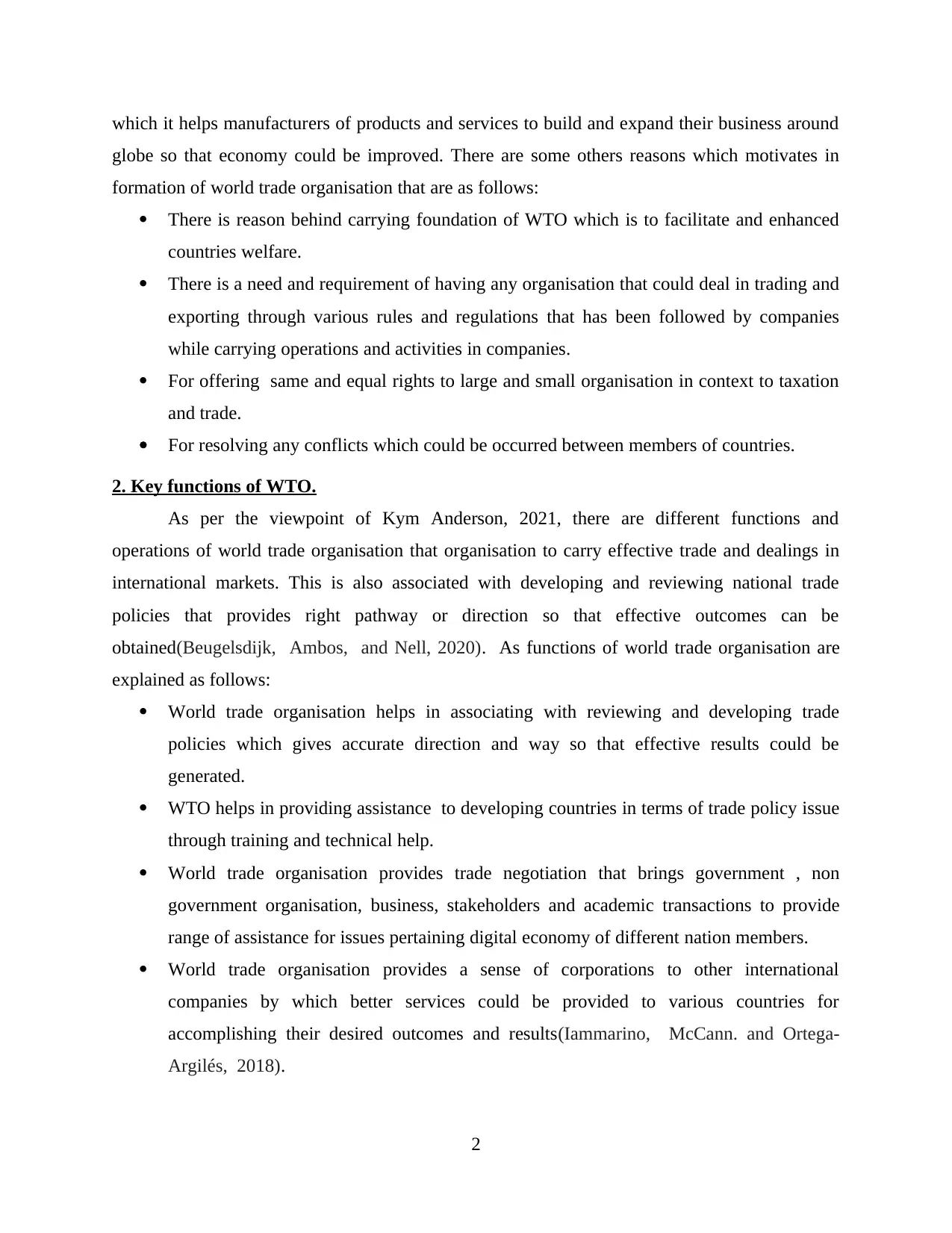
which it helps manufacturers of products and services to build and expand their business around
globe so that economy could be improved. There are some others reasons which motivates in
formation of world trade organisation that are as follows:
There is reason behind carrying foundation of WTO which is to facilitate and enhanced
countries welfare.
There is a need and requirement of having any organisation that could deal in trading and
exporting through various rules and regulations that has been followed by companies
while carrying operations and activities in companies.
For offering same and equal rights to large and small organisation in context to taxation
and trade.
For resolving any conflicts which could be occurred between members of countries.
2. Key functions of WTO.
As per the viewpoint of Kym Anderson, 2021, there are different functions and
operations of world trade organisation that organisation to carry effective trade and dealings in
international markets. This is also associated with developing and reviewing national trade
policies that provides right pathway or direction so that effective outcomes can be
obtained(Beugelsdijk, Ambos, and Nell, 2020). As functions of world trade organisation are
explained as follows:
World trade organisation helps in associating with reviewing and developing trade
policies which gives accurate direction and way so that effective results could be
generated.
WTO helps in providing assistance to developing countries in terms of trade policy issue
through training and technical help.
World trade organisation provides trade negotiation that brings government , non
government organisation, business, stakeholders and academic transactions to provide
range of assistance for issues pertaining digital economy of different nation members.
World trade organisation provides a sense of corporations to other international
companies by which better services could be provided to various countries for
accomplishing their desired outcomes and results(Iammarino, McCann. and Ortega-
Argilés, 2018).
2
globe so that economy could be improved. There are some others reasons which motivates in
formation of world trade organisation that are as follows:
There is reason behind carrying foundation of WTO which is to facilitate and enhanced
countries welfare.
There is a need and requirement of having any organisation that could deal in trading and
exporting through various rules and regulations that has been followed by companies
while carrying operations and activities in companies.
For offering same and equal rights to large and small organisation in context to taxation
and trade.
For resolving any conflicts which could be occurred between members of countries.
2. Key functions of WTO.
As per the viewpoint of Kym Anderson, 2021, there are different functions and
operations of world trade organisation that organisation to carry effective trade and dealings in
international markets. This is also associated with developing and reviewing national trade
policies that provides right pathway or direction so that effective outcomes can be
obtained(Beugelsdijk, Ambos, and Nell, 2020). As functions of world trade organisation are
explained as follows:
World trade organisation helps in associating with reviewing and developing trade
policies which gives accurate direction and way so that effective results could be
generated.
WTO helps in providing assistance to developing countries in terms of trade policy issue
through training and technical help.
World trade organisation provides trade negotiation that brings government , non
government organisation, business, stakeholders and academic transactions to provide
range of assistance for issues pertaining digital economy of different nation members.
World trade organisation provides a sense of corporations to other international
companies by which better services could be provided to various countries for
accomplishing their desired outcomes and results(Iammarino, McCann. and Ortega-
Argilés, 2018).
2
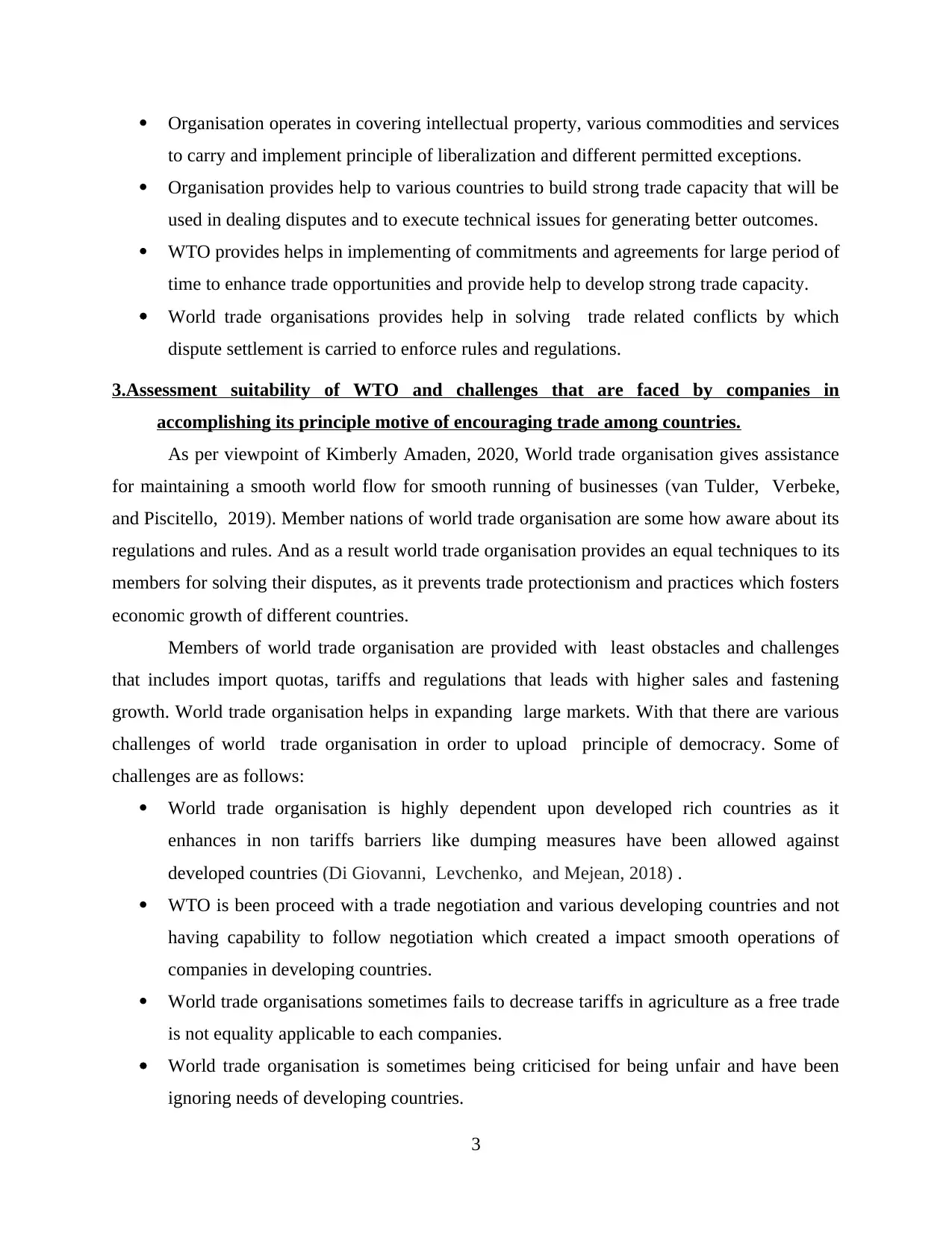
Organisation operates in covering intellectual property, various commodities and services
to carry and implement principle of liberalization and different permitted exceptions.
Organisation provides help to various countries to build strong trade capacity that will be
used in dealing disputes and to execute technical issues for generating better outcomes.
WTO provides helps in implementing of commitments and agreements for large period of
time to enhance trade opportunities and provide help to develop strong trade capacity.
World trade organisations provides help in solving trade related conflicts by which
dispute settlement is carried to enforce rules and regulations.
3.Assessment suitability of WTO and challenges that are faced by companies in
accomplishing its principle motive of encouraging trade among countries.
As per viewpoint of Kimberly Amaden, 2020, World trade organisation gives assistance
for maintaining a smooth world flow for smooth running of businesses (van Tulder, Verbeke,
and Piscitello, 2019). Member nations of world trade organisation are some how aware about its
regulations and rules. And as a result world trade organisation provides an equal techniques to its
members for solving their disputes, as it prevents trade protectionism and practices which fosters
economic growth of different countries.
Members of world trade organisation are provided with least obstacles and challenges
that includes import quotas, tariffs and regulations that leads with higher sales and fastening
growth. World trade organisation helps in expanding large markets. With that there are various
challenges of world trade organisation in order to upload principle of democracy. Some of
challenges are as follows:
World trade organisation is highly dependent upon developed rich countries as it
enhances in non tariffs barriers like dumping measures have been allowed against
developed countries (Di Giovanni, Levchenko, and Mejean, 2018) .
WTO is been proceed with a trade negotiation and various developing countries and not
having capability to follow negotiation which created a impact smooth operations of
companies in developing countries.
World trade organisations sometimes fails to decrease tariffs in agriculture as a free trade
is not equality applicable to each companies.
World trade organisation is sometimes being criticised for being unfair and have been
ignoring needs of developing countries.
3
to carry and implement principle of liberalization and different permitted exceptions.
Organisation provides help to various countries to build strong trade capacity that will be
used in dealing disputes and to execute technical issues for generating better outcomes.
WTO provides helps in implementing of commitments and agreements for large period of
time to enhance trade opportunities and provide help to develop strong trade capacity.
World trade organisations provides help in solving trade related conflicts by which
dispute settlement is carried to enforce rules and regulations.
3.Assessment suitability of WTO and challenges that are faced by companies in
accomplishing its principle motive of encouraging trade among countries.
As per viewpoint of Kimberly Amaden, 2020, World trade organisation gives assistance
for maintaining a smooth world flow for smooth running of businesses (van Tulder, Verbeke,
and Piscitello, 2019). Member nations of world trade organisation are some how aware about its
regulations and rules. And as a result world trade organisation provides an equal techniques to its
members for solving their disputes, as it prevents trade protectionism and practices which fosters
economic growth of different countries.
Members of world trade organisation are provided with least obstacles and challenges
that includes import quotas, tariffs and regulations that leads with higher sales and fastening
growth. World trade organisation helps in expanding large markets. With that there are various
challenges of world trade organisation in order to upload principle of democracy. Some of
challenges are as follows:
World trade organisation is highly dependent upon developed rich countries as it
enhances in non tariffs barriers like dumping measures have been allowed against
developed countries (Di Giovanni, Levchenko, and Mejean, 2018) .
WTO is been proceed with a trade negotiation and various developing countries and not
having capability to follow negotiation which created a impact smooth operations of
companies in developing countries.
World trade organisations sometimes fails to decrease tariffs in agriculture as a free trade
is not equality applicable to each companies.
World trade organisation is sometimes being criticised for being unfair and have been
ignoring needs of developing countries.
3
⊘ This is a preview!⊘
Do you want full access?
Subscribe today to unlock all pages.

Trusted by 1+ million students worldwide
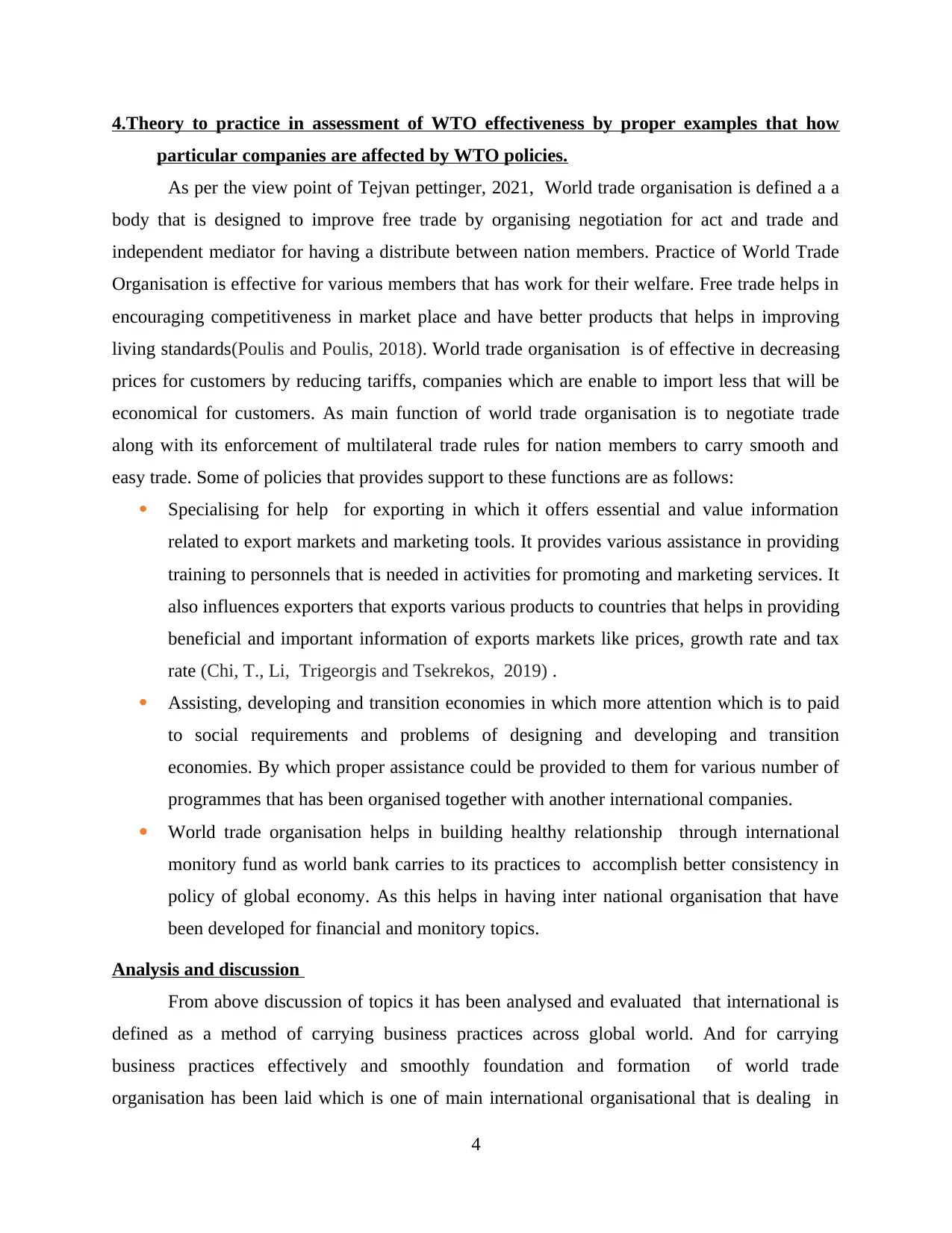
4.Theory to practice in assessment of WTO effectiveness by proper examples that how
particular companies are affected by WTO policies.
As per the view point of Tejvan pettinger, 2021, World trade organisation is defined a a
body that is designed to improve free trade by organising negotiation for act and trade and
independent mediator for having a distribute between nation members. Practice of World Trade
Organisation is effective for various members that has work for their welfare. Free trade helps in
encouraging competitiveness in market place and have better products that helps in improving
living standards(Poulis and Poulis, 2018). World trade organisation is of effective in decreasing
prices for customers by reducing tariffs, companies which are enable to import less that will be
economical for customers. As main function of world trade organisation is to negotiate trade
along with its enforcement of multilateral trade rules for nation members to carry smooth and
easy trade. Some of policies that provides support to these functions are as follows:
Specialising for help for exporting in which it offers essential and value information
related to export markets and marketing tools. It provides various assistance in providing
training to personnels that is needed in activities for promoting and marketing services. It
also influences exporters that exports various products to countries that helps in providing
beneficial and important information of exports markets like prices, growth rate and tax
rate (Chi, T., Li, Trigeorgis and Tsekrekos, 2019) .
Assisting, developing and transition economies in which more attention which is to paid
to social requirements and problems of designing and developing and transition
economies. By which proper assistance could be provided to them for various number of
programmes that has been organised together with another international companies.
World trade organisation helps in building healthy relationship through international
monitory fund as world bank carries to its practices to accomplish better consistency in
policy of global economy. As this helps in having inter national organisation that have
been developed for financial and monitory topics.
Analysis and discussion
From above discussion of topics it has been analysed and evaluated that international is
defined as a method of carrying business practices across global world. And for carrying
business practices effectively and smoothly foundation and formation of world trade
organisation has been laid which is one of main international organisational that is dealing in
4
particular companies are affected by WTO policies.
As per the view point of Tejvan pettinger, 2021, World trade organisation is defined a a
body that is designed to improve free trade by organising negotiation for act and trade and
independent mediator for having a distribute between nation members. Practice of World Trade
Organisation is effective for various members that has work for their welfare. Free trade helps in
encouraging competitiveness in market place and have better products that helps in improving
living standards(Poulis and Poulis, 2018). World trade organisation is of effective in decreasing
prices for customers by reducing tariffs, companies which are enable to import less that will be
economical for customers. As main function of world trade organisation is to negotiate trade
along with its enforcement of multilateral trade rules for nation members to carry smooth and
easy trade. Some of policies that provides support to these functions are as follows:
Specialising for help for exporting in which it offers essential and value information
related to export markets and marketing tools. It provides various assistance in providing
training to personnels that is needed in activities for promoting and marketing services. It
also influences exporters that exports various products to countries that helps in providing
beneficial and important information of exports markets like prices, growth rate and tax
rate (Chi, T., Li, Trigeorgis and Tsekrekos, 2019) .
Assisting, developing and transition economies in which more attention which is to paid
to social requirements and problems of designing and developing and transition
economies. By which proper assistance could be provided to them for various number of
programmes that has been organised together with another international companies.
World trade organisation helps in building healthy relationship through international
monitory fund as world bank carries to its practices to accomplish better consistency in
policy of global economy. As this helps in having inter national organisation that have
been developed for financial and monitory topics.
Analysis and discussion
From above discussion of topics it has been analysed and evaluated that international is
defined as a method of carrying business practices across global world. And for carrying
business practices effectively and smoothly foundation and formation of world trade
organisation has been laid which is one of main international organisational that is dealing in
4
Paraphrase This Document
Need a fresh take? Get an instant paraphrase of this document with our AI Paraphraser
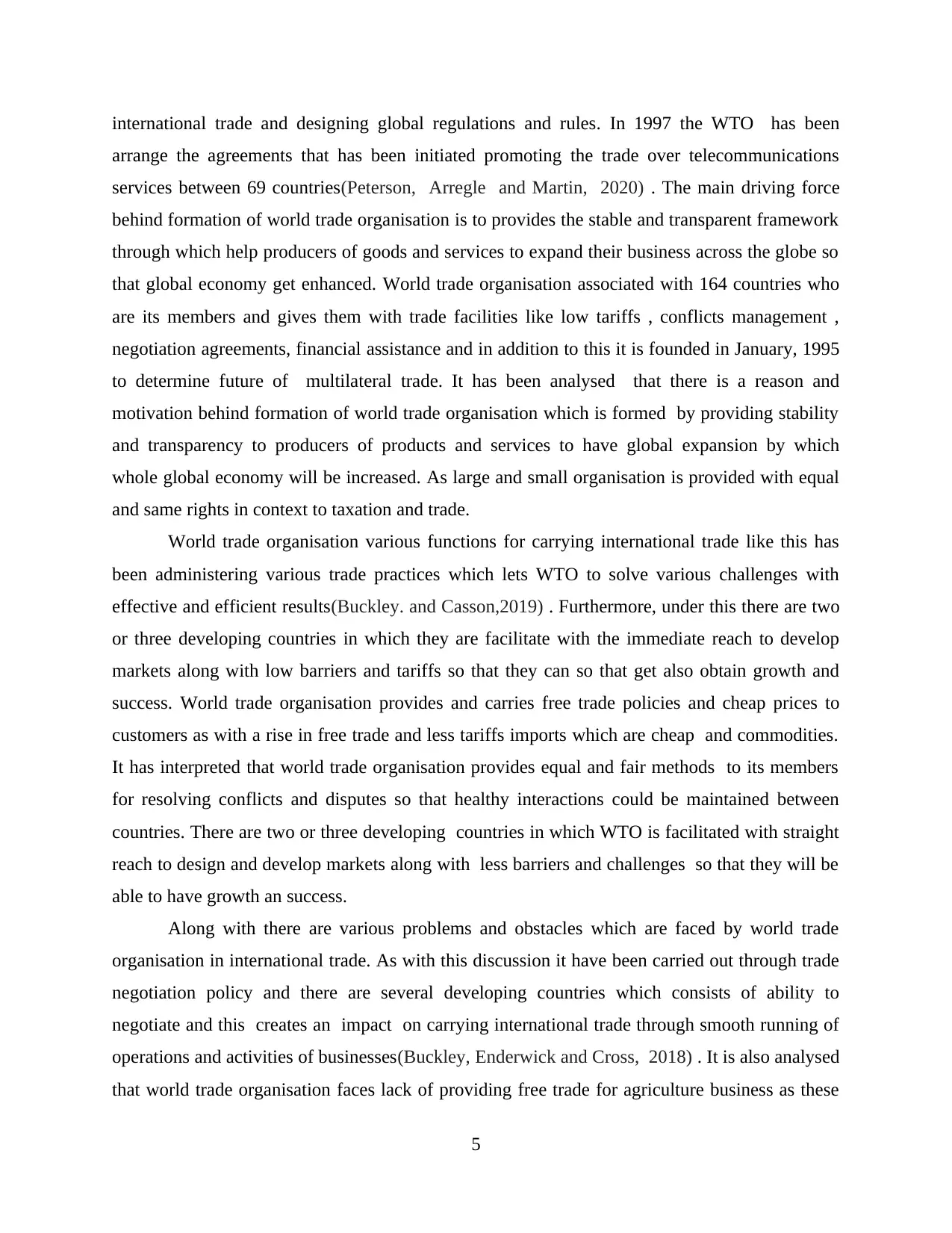
international trade and designing global regulations and rules. In 1997 the WTO has been
arrange the agreements that has been initiated promoting the trade over telecommunications
services between 69 countries(Peterson, Arregle and Martin, 2020) . The main driving force
behind formation of world trade organisation is to provides the stable and transparent framework
through which help producers of goods and services to expand their business across the globe so
that global economy get enhanced. World trade organisation associated with 164 countries who
are its members and gives them with trade facilities like low tariffs , conflicts management ,
negotiation agreements, financial assistance and in addition to this it is founded in January, 1995
to determine future of multilateral trade. It has been analysed that there is a reason and
motivation behind formation of world trade organisation which is formed by providing stability
and transparency to producers of products and services to have global expansion by which
whole global economy will be increased. As large and small organisation is provided with equal
and same rights in context to taxation and trade.
World trade organisation various functions for carrying international trade like this has
been administering various trade practices which lets WTO to solve various challenges with
effective and efficient results(Buckley. and Casson,2019) . Furthermore, under this there are two
or three developing countries in which they are facilitate with the immediate reach to develop
markets along with low barriers and tariffs so that they can so that get also obtain growth and
success. World trade organisation provides and carries free trade policies and cheap prices to
customers as with a rise in free trade and less tariffs imports which are cheap and commodities.
It has interpreted that world trade organisation provides equal and fair methods to its members
for resolving conflicts and disputes so that healthy interactions could be maintained between
countries. There are two or three developing countries in which WTO is facilitated with straight
reach to design and develop markets along with less barriers and challenges so that they will be
able to have growth an success.
Along with there are various problems and obstacles which are faced by world trade
organisation in international trade. As with this discussion it have been carried out through trade
negotiation policy and there are several developing countries which consists of ability to
negotiate and this creates an impact on carrying international trade through smooth running of
operations and activities of businesses(Buckley, Enderwick and Cross, 2018) . It is also analysed
that world trade organisation faces lack of providing free trade for agriculture business as these
5
arrange the agreements that has been initiated promoting the trade over telecommunications
services between 69 countries(Peterson, Arregle and Martin, 2020) . The main driving force
behind formation of world trade organisation is to provides the stable and transparent framework
through which help producers of goods and services to expand their business across the globe so
that global economy get enhanced. World trade organisation associated with 164 countries who
are its members and gives them with trade facilities like low tariffs , conflicts management ,
negotiation agreements, financial assistance and in addition to this it is founded in January, 1995
to determine future of multilateral trade. It has been analysed that there is a reason and
motivation behind formation of world trade organisation which is formed by providing stability
and transparency to producers of products and services to have global expansion by which
whole global economy will be increased. As large and small organisation is provided with equal
and same rights in context to taxation and trade.
World trade organisation various functions for carrying international trade like this has
been administering various trade practices which lets WTO to solve various challenges with
effective and efficient results(Buckley. and Casson,2019) . Furthermore, under this there are two
or three developing countries in which they are facilitate with the immediate reach to develop
markets along with low barriers and tariffs so that they can so that get also obtain growth and
success. World trade organisation provides and carries free trade policies and cheap prices to
customers as with a rise in free trade and less tariffs imports which are cheap and commodities.
It has interpreted that world trade organisation provides equal and fair methods to its members
for resolving conflicts and disputes so that healthy interactions could be maintained between
countries. There are two or three developing countries in which WTO is facilitated with straight
reach to design and develop markets along with less barriers and challenges so that they will be
able to have growth an success.
Along with there are various problems and obstacles which are faced by world trade
organisation in international trade. As with this discussion it have been carried out through trade
negotiation policy and there are several developing countries which consists of ability to
negotiate and this creates an impact on carrying international trade through smooth running of
operations and activities of businesses(Buckley, Enderwick and Cross, 2018) . It is also analysed
that world trade organisation faces lack of providing free trade for agriculture business as these
5
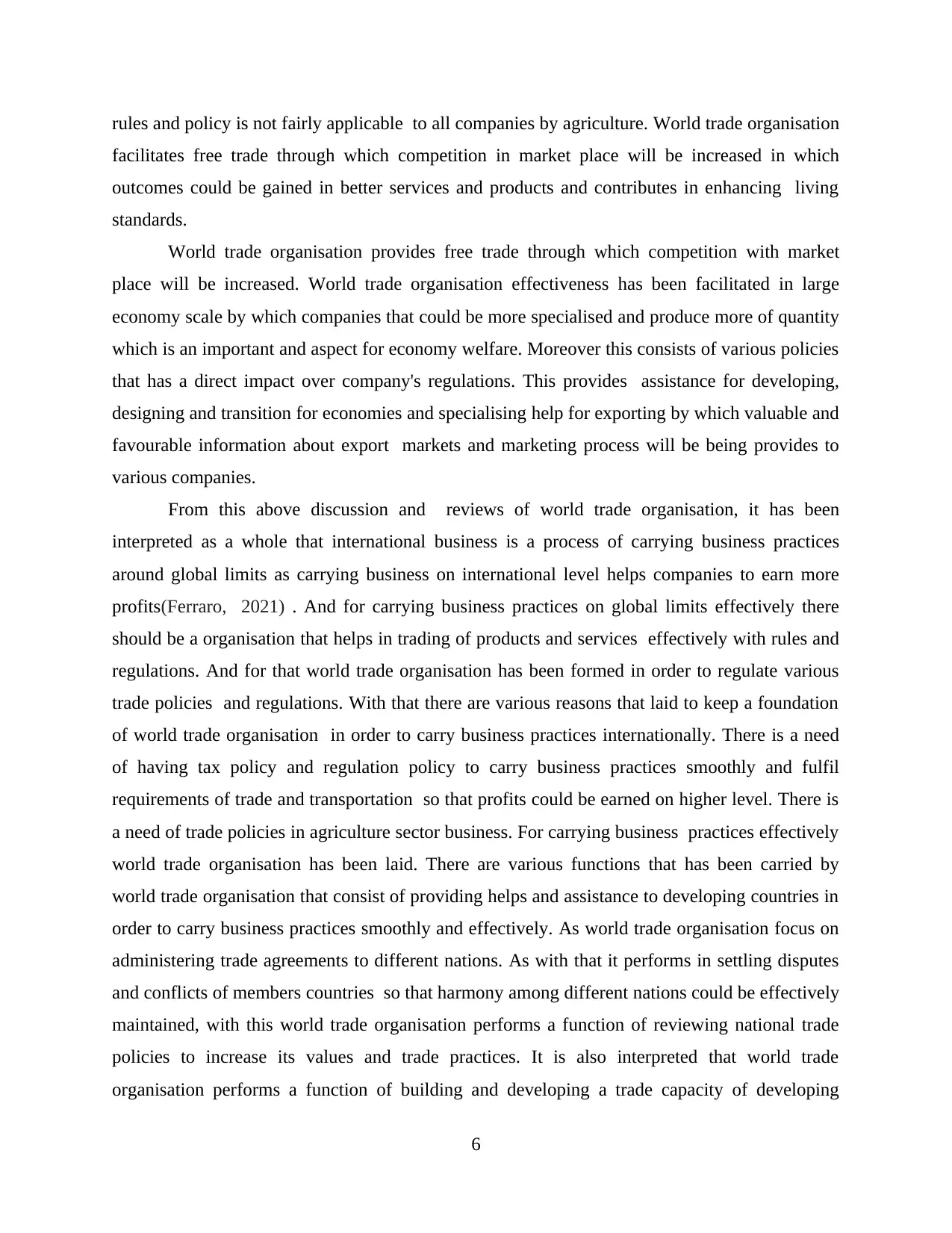
rules and policy is not fairly applicable to all companies by agriculture. World trade organisation
facilitates free trade through which competition in market place will be increased in which
outcomes could be gained in better services and products and contributes in enhancing living
standards.
World trade organisation provides free trade through which competition with market
place will be increased. World trade organisation effectiveness has been facilitated in large
economy scale by which companies that could be more specialised and produce more of quantity
which is an important and aspect for economy welfare. Moreover this consists of various policies
that has a direct impact over company's regulations. This provides assistance for developing,
designing and transition for economies and specialising help for exporting by which valuable and
favourable information about export markets and marketing process will be being provides to
various companies.
From this above discussion and reviews of world trade organisation, it has been
interpreted as a whole that international business is a process of carrying business practices
around global limits as carrying business on international level helps companies to earn more
profits(Ferraro, 2021) . And for carrying business practices on global limits effectively there
should be a organisation that helps in trading of products and services effectively with rules and
regulations. And for that world trade organisation has been formed in order to regulate various
trade policies and regulations. With that there are various reasons that laid to keep a foundation
of world trade organisation in order to carry business practices internationally. There is a need
of having tax policy and regulation policy to carry business practices smoothly and fulfil
requirements of trade and transportation so that profits could be earned on higher level. There is
a need of trade policies in agriculture sector business. For carrying business practices effectively
world trade organisation has been laid. There are various functions that has been carried by
world trade organisation that consist of providing helps and assistance to developing countries in
order to carry business practices smoothly and effectively. As world trade organisation focus on
administering trade agreements to different nations. As with that it performs in settling disputes
and conflicts of members countries so that harmony among different nations could be effectively
maintained, with this world trade organisation performs a function of reviewing national trade
policies to increase its values and trade practices. It is also interpreted that world trade
organisation performs a function of building and developing a trade capacity of developing
6
facilitates free trade through which competition in market place will be increased in which
outcomes could be gained in better services and products and contributes in enhancing living
standards.
World trade organisation provides free trade through which competition with market
place will be increased. World trade organisation effectiveness has been facilitated in large
economy scale by which companies that could be more specialised and produce more of quantity
which is an important and aspect for economy welfare. Moreover this consists of various policies
that has a direct impact over company's regulations. This provides assistance for developing,
designing and transition for economies and specialising help for exporting by which valuable and
favourable information about export markets and marketing process will be being provides to
various companies.
From this above discussion and reviews of world trade organisation, it has been
interpreted as a whole that international business is a process of carrying business practices
around global limits as carrying business on international level helps companies to earn more
profits(Ferraro, 2021) . And for carrying business practices on global limits effectively there
should be a organisation that helps in trading of products and services effectively with rules and
regulations. And for that world trade organisation has been formed in order to regulate various
trade policies and regulations. With that there are various reasons that laid to keep a foundation
of world trade organisation in order to carry business practices internationally. There is a need
of having tax policy and regulation policy to carry business practices smoothly and fulfil
requirements of trade and transportation so that profits could be earned on higher level. There is
a need of trade policies in agriculture sector business. For carrying business practices effectively
world trade organisation has been laid. There are various functions that has been carried by
world trade organisation that consist of providing helps and assistance to developing countries in
order to carry business practices smoothly and effectively. As world trade organisation focus on
administering trade agreements to different nations. As with that it performs in settling disputes
and conflicts of members countries so that harmony among different nations could be effectively
maintained, with this world trade organisation performs a function of reviewing national trade
policies to increase its values and trade practices. It is also interpreted that world trade
organisation performs a function of building and developing a trade capacity of developing
6
⊘ This is a preview!⊘
Do you want full access?
Subscribe today to unlock all pages.

Trusted by 1+ million students worldwide
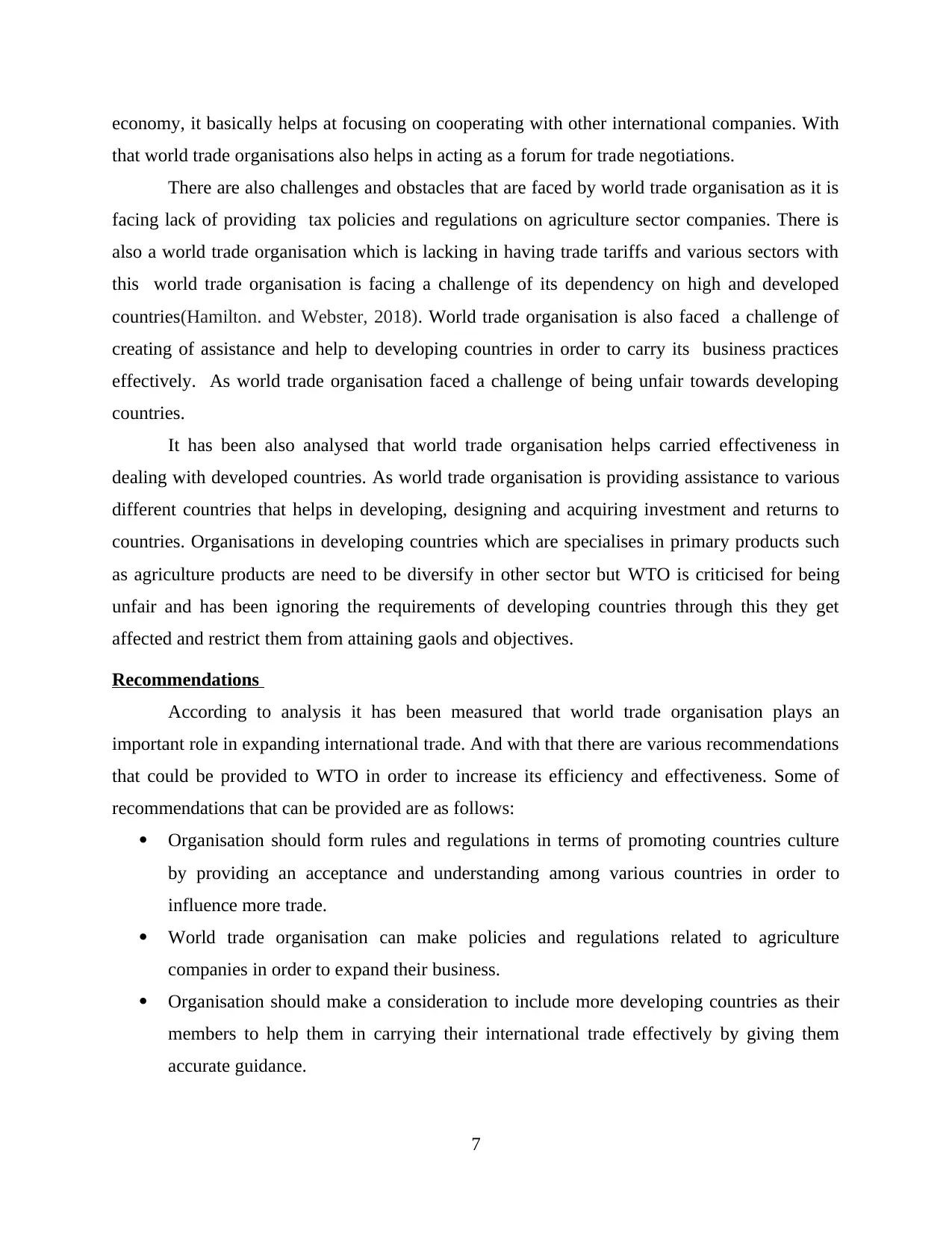
economy, it basically helps at focusing on cooperating with other international companies. With
that world trade organisations also helps in acting as a forum for trade negotiations.
There are also challenges and obstacles that are faced by world trade organisation as it is
facing lack of providing tax policies and regulations on agriculture sector companies. There is
also a world trade organisation which is lacking in having trade tariffs and various sectors with
this world trade organisation is facing a challenge of its dependency on high and developed
countries(Hamilton. and Webster, 2018). World trade organisation is also faced a challenge of
creating of assistance and help to developing countries in order to carry its business practices
effectively. As world trade organisation faced a challenge of being unfair towards developing
countries.
It has been also analysed that world trade organisation helps carried effectiveness in
dealing with developed countries. As world trade organisation is providing assistance to various
different countries that helps in developing, designing and acquiring investment and returns to
countries. Organisations in developing countries which are specialises in primary products such
as agriculture products are need to be diversify in other sector but WTO is criticised for being
unfair and has been ignoring the requirements of developing countries through this they get
affected and restrict them from attaining gaols and objectives.
Recommendations
According to analysis it has been measured that world trade organisation plays an
important role in expanding international trade. And with that there are various recommendations
that could be provided to WTO in order to increase its efficiency and effectiveness. Some of
recommendations that can be provided are as follows:
Organisation should form rules and regulations in terms of promoting countries culture
by providing an acceptance and understanding among various countries in order to
influence more trade.
World trade organisation can make policies and regulations related to agriculture
companies in order to expand their business.
Organisation should make a consideration to include more developing countries as their
members to help them in carrying their international trade effectively by giving them
accurate guidance.
7
that world trade organisations also helps in acting as a forum for trade negotiations.
There are also challenges and obstacles that are faced by world trade organisation as it is
facing lack of providing tax policies and regulations on agriculture sector companies. There is
also a world trade organisation which is lacking in having trade tariffs and various sectors with
this world trade organisation is facing a challenge of its dependency on high and developed
countries(Hamilton. and Webster, 2018). World trade organisation is also faced a challenge of
creating of assistance and help to developing countries in order to carry its business practices
effectively. As world trade organisation faced a challenge of being unfair towards developing
countries.
It has been also analysed that world trade organisation helps carried effectiveness in
dealing with developed countries. As world trade organisation is providing assistance to various
different countries that helps in developing, designing and acquiring investment and returns to
countries. Organisations in developing countries which are specialises in primary products such
as agriculture products are need to be diversify in other sector but WTO is criticised for being
unfair and has been ignoring the requirements of developing countries through this they get
affected and restrict them from attaining gaols and objectives.
Recommendations
According to analysis it has been measured that world trade organisation plays an
important role in expanding international trade. And with that there are various recommendations
that could be provided to WTO in order to increase its efficiency and effectiveness. Some of
recommendations that can be provided are as follows:
Organisation should form rules and regulations in terms of promoting countries culture
by providing an acceptance and understanding among various countries in order to
influence more trade.
World trade organisation can make policies and regulations related to agriculture
companies in order to expand their business.
Organisation should make a consideration to include more developing countries as their
members to help them in carrying their international trade effectively by giving them
accurate guidance.
7
Paraphrase This Document
Need a fresh take? Get an instant paraphrase of this document with our AI Paraphraser
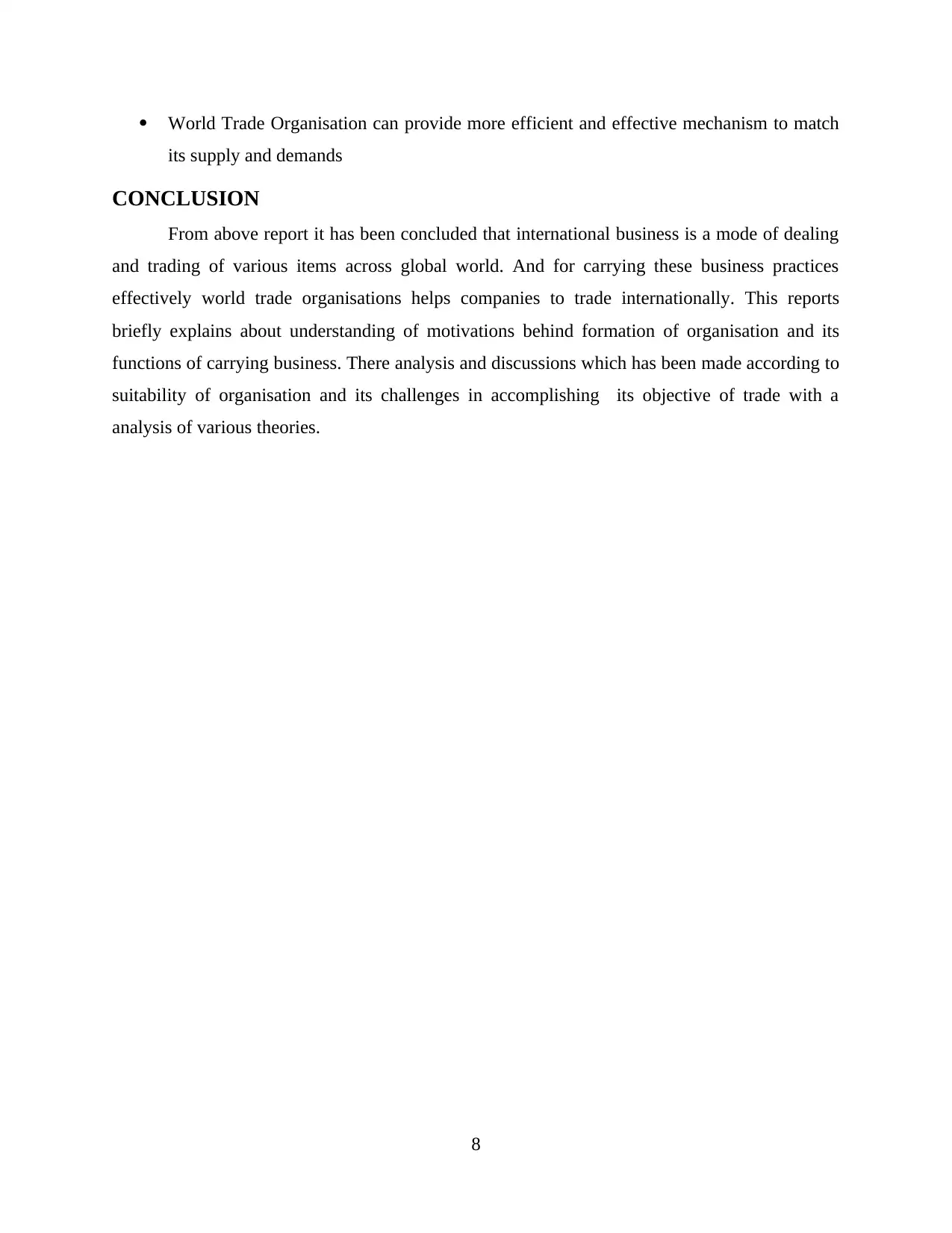
World Trade Organisation can provide more efficient and effective mechanism to match
its supply and demands
CONCLUSION
From above report it has been concluded that international business is a mode of dealing
and trading of various items across global world. And for carrying these business practices
effectively world trade organisations helps companies to trade internationally. This reports
briefly explains about understanding of motivations behind formation of organisation and its
functions of carrying business. There analysis and discussions which has been made according to
suitability of organisation and its challenges in accomplishing its objective of trade with a
analysis of various theories.
8
its supply and demands
CONCLUSION
From above report it has been concluded that international business is a mode of dealing
and trading of various items across global world. And for carrying these business practices
effectively world trade organisations helps companies to trade internationally. This reports
briefly explains about understanding of motivations behind formation of organisation and its
functions of carrying business. There analysis and discussions which has been made according to
suitability of organisation and its challenges in accomplishing its objective of trade with a
analysis of various theories.
8
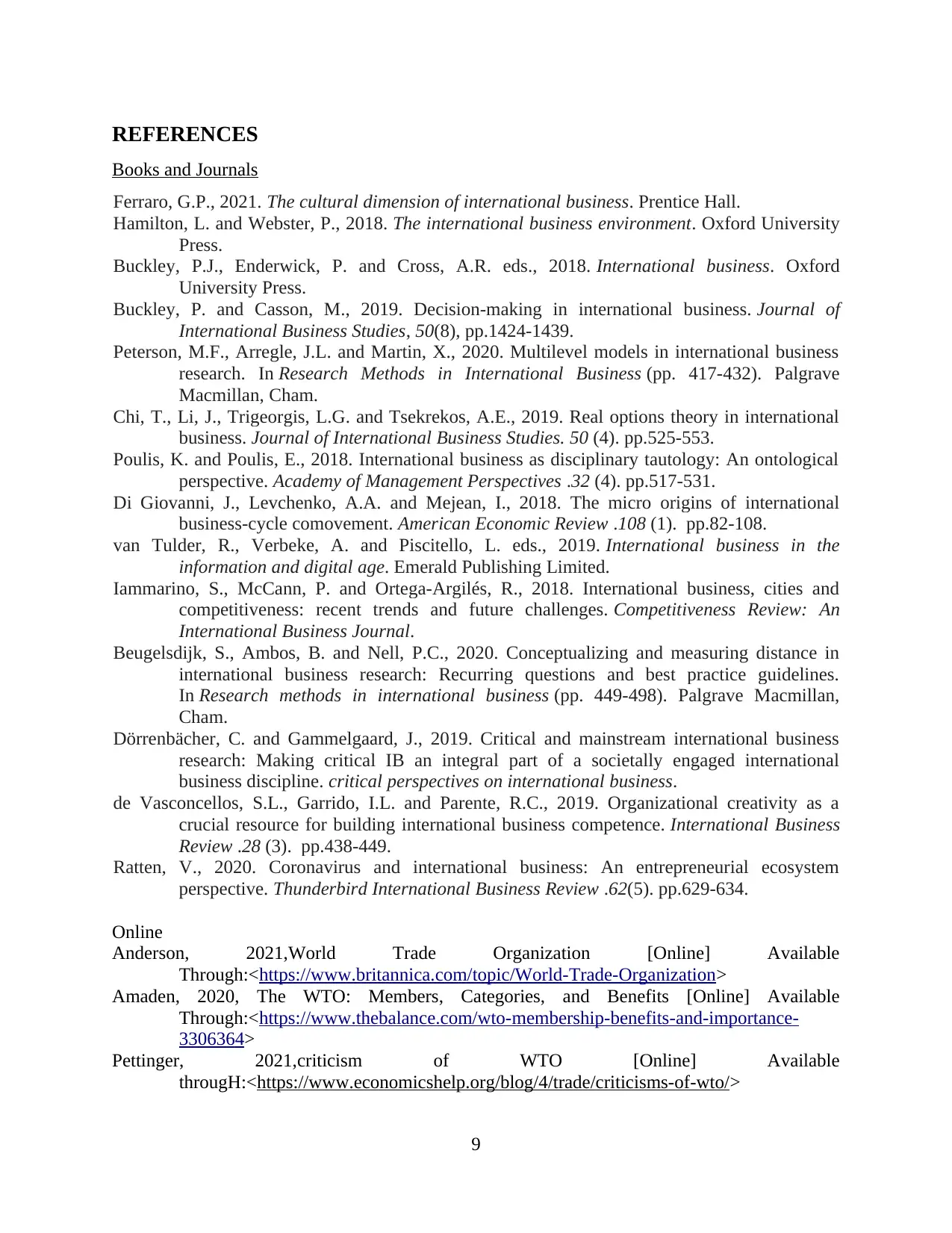
REFERENCES
Books and Journals
Ferraro, G.P., 2021. The cultural dimension of international business. Prentice Hall.
Hamilton, L. and Webster, P., 2018. The international business environment. Oxford University
Press.
Buckley, P.J., Enderwick, P. and Cross, A.R. eds., 2018. International business. Oxford
University Press.
Buckley, P. and Casson, M., 2019. Decision-making in international business. Journal of
International Business Studies, 50(8), pp.1424-1439.
Peterson, M.F., Arregle, J.L. and Martin, X., 2020. Multilevel models in international business
research. In Research Methods in International Business (pp. 417-432). Palgrave
Macmillan, Cham.
Chi, T., Li, J., Trigeorgis, L.G. and Tsekrekos, A.E., 2019. Real options theory in international
business. Journal of International Business Studies. 50 (4). pp.525-553.
Poulis, K. and Poulis, E., 2018. International business as disciplinary tautology: An ontological
perspective. Academy of Management Perspectives .32 (4). pp.517-531.
Di Giovanni, J., Levchenko, A.A. and Mejean, I., 2018. The micro origins of international
business-cycle comovement. American Economic Review .108 (1). pp.82-108.
van Tulder, R., Verbeke, A. and Piscitello, L. eds., 2019. International business in the
information and digital age. Emerald Publishing Limited.
Iammarino, S., McCann, P. and Ortega-Argilés, R., 2018. International business, cities and
competitiveness: recent trends and future challenges. Competitiveness Review: An
International Business Journal.
Beugelsdijk, S., Ambos, B. and Nell, P.C., 2020. Conceptualizing and measuring distance in
international business research: Recurring questions and best practice guidelines.
In Research methods in international business (pp. 449-498). Palgrave Macmillan,
Cham.
Dörrenbächer, C. and Gammelgaard, J., 2019. Critical and mainstream international business
research: Making critical IB an integral part of a societally engaged international
business discipline. critical perspectives on international business.
de Vasconcellos, S.L., Garrido, I.L. and Parente, R.C., 2019. Organizational creativity as a
crucial resource for building international business competence. International Business
Review .28 (3). pp.438-449.
Ratten, V., 2020. Coronavirus and international business: An entrepreneurial ecosystem
perspective. Thunderbird International Business Review .62(5). pp.629-634.
Online
Anderson, 2021,World Trade Organization [Online] Available
Through:<https://www.britannica.com/topic/World-Trade-Organization>
Amaden, 2020, The WTO: Members, Categories, and Benefits [Online] Available
Through:<https://www.thebalance.com/wto-membership-benefits-and-importance-
3306364>
Pettinger, 2021,criticism of WTO [Online] Available
througH:<https://www.economicshelp.org/blog/4/trade/criticisms-of-wto/>
9
Books and Journals
Ferraro, G.P., 2021. The cultural dimension of international business. Prentice Hall.
Hamilton, L. and Webster, P., 2018. The international business environment. Oxford University
Press.
Buckley, P.J., Enderwick, P. and Cross, A.R. eds., 2018. International business. Oxford
University Press.
Buckley, P. and Casson, M., 2019. Decision-making in international business. Journal of
International Business Studies, 50(8), pp.1424-1439.
Peterson, M.F., Arregle, J.L. and Martin, X., 2020. Multilevel models in international business
research. In Research Methods in International Business (pp. 417-432). Palgrave
Macmillan, Cham.
Chi, T., Li, J., Trigeorgis, L.G. and Tsekrekos, A.E., 2019. Real options theory in international
business. Journal of International Business Studies. 50 (4). pp.525-553.
Poulis, K. and Poulis, E., 2018. International business as disciplinary tautology: An ontological
perspective. Academy of Management Perspectives .32 (4). pp.517-531.
Di Giovanni, J., Levchenko, A.A. and Mejean, I., 2018. The micro origins of international
business-cycle comovement. American Economic Review .108 (1). pp.82-108.
van Tulder, R., Verbeke, A. and Piscitello, L. eds., 2019. International business in the
information and digital age. Emerald Publishing Limited.
Iammarino, S., McCann, P. and Ortega-Argilés, R., 2018. International business, cities and
competitiveness: recent trends and future challenges. Competitiveness Review: An
International Business Journal.
Beugelsdijk, S., Ambos, B. and Nell, P.C., 2020. Conceptualizing and measuring distance in
international business research: Recurring questions and best practice guidelines.
In Research methods in international business (pp. 449-498). Palgrave Macmillan,
Cham.
Dörrenbächer, C. and Gammelgaard, J., 2019. Critical and mainstream international business
research: Making critical IB an integral part of a societally engaged international
business discipline. critical perspectives on international business.
de Vasconcellos, S.L., Garrido, I.L. and Parente, R.C., 2019. Organizational creativity as a
crucial resource for building international business competence. International Business
Review .28 (3). pp.438-449.
Ratten, V., 2020. Coronavirus and international business: An entrepreneurial ecosystem
perspective. Thunderbird International Business Review .62(5). pp.629-634.
Online
Anderson, 2021,World Trade Organization [Online] Available
Through:<https://www.britannica.com/topic/World-Trade-Organization>
Amaden, 2020, The WTO: Members, Categories, and Benefits [Online] Available
Through:<https://www.thebalance.com/wto-membership-benefits-and-importance-
3306364>
Pettinger, 2021,criticism of WTO [Online] Available
througH:<https://www.economicshelp.org/blog/4/trade/criticisms-of-wto/>
9
⊘ This is a preview!⊘
Do you want full access?
Subscribe today to unlock all pages.

Trusted by 1+ million students worldwide
1 out of 13
Related Documents
Your All-in-One AI-Powered Toolkit for Academic Success.
+13062052269
info@desklib.com
Available 24*7 on WhatsApp / Email
![[object Object]](/_next/static/media/star-bottom.7253800d.svg)
Unlock your academic potential
Copyright © 2020–2026 A2Z Services. All Rights Reserved. Developed and managed by ZUCOL.





